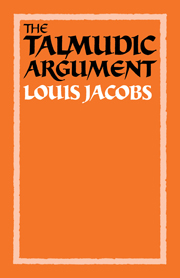Book contents
- Frontmatter
- Contents
- Preface
- Note on transliteration
- Note on Biblical translations
- Note on the Babylonian Talmud
- List of Abbreviations
- 1 The Talmudic argument
- 2 The literary form of the Babylonian Talmud
- 3 Berērah: retrospective specification
- 4 Yeúsh she-lo mi-da‘at: unconscious abandonment of property
- 5 Rubba: probability
- 6 Davar she-lo ba le-'olam: conveyance of a thing not yet in existence
- 7 Kol she-eyno be-zeh aḥar zeh afilu be-vat aḥat eyno: whatever cannot be established in a consecutive sequence cannot be established even in a simultaneous sequence
- 8 Yesh ḥoresh telem eḥad: a single act of ploughing can result in a number of penalties
- 9 Simanin de-oraita o de-rabbanan: whether reliance on distinguishing marks for the purpose of identification is Biblical or Rabbinic
- 10 Devarim she-be-lev eynam devarim: mental reservations in contracts are disregarded
- 11 Ḥazakah: presumptive state
- 12 Gadol kevod ha-beriot: the law and regard for human dignity
- 13 Hazmanah milta: whether the designation of an object for a particular use is effective
- 14 Mitzvat ‘aseh she-ha-zeman geramah: positive precepts dependent on time from which women are exempt
- 15 Heyzek she-eyno nikar: indiscernible damage to property
- 16 Kinyan ḥatzer: acquisition by means of a domain
- 17 Palginan be-dibbura: admission of part of a testimony even though another part of the same testimony is rejected
- 18 Tadir u-mekuddash: which takes precedence: the more constant or the more sacred?
- 19 Palga nizka: the nature of the payment of half-damages to which the owner of a goring ox is liable
- 20 Patur mi-diney adam ve-ḥayyav be-diney shamayim: cases where there is liability in the eyes of God even though the human courts cannot enforce payment
- 21 Maḥal ‘al kevodo kevodo maḥul: renunciation of honour by one to whom it is due
- 22 Conclusions
- Glossary
- Bibliography
11 - Ḥazakah: presumptive state
Published online by Cambridge University Press: 06 January 2010
- Frontmatter
- Contents
- Preface
- Note on transliteration
- Note on Biblical translations
- Note on the Babylonian Talmud
- List of Abbreviations
- 1 The Talmudic argument
- 2 The literary form of the Babylonian Talmud
- 3 Berērah: retrospective specification
- 4 Yeúsh she-lo mi-da‘at: unconscious abandonment of property
- 5 Rubba: probability
- 6 Davar she-lo ba le-'olam: conveyance of a thing not yet in existence
- 7 Kol she-eyno be-zeh aḥar zeh afilu be-vat aḥat eyno: whatever cannot be established in a consecutive sequence cannot be established even in a simultaneous sequence
- 8 Yesh ḥoresh telem eḥad: a single act of ploughing can result in a number of penalties
- 9 Simanin de-oraita o de-rabbanan: whether reliance on distinguishing marks for the purpose of identification is Biblical or Rabbinic
- 10 Devarim she-be-lev eynam devarim: mental reservations in contracts are disregarded
- 11 Ḥazakah: presumptive state
- 12 Gadol kevod ha-beriot: the law and regard for human dignity
- 13 Hazmanah milta: whether the designation of an object for a particular use is effective
- 14 Mitzvat ‘aseh she-ha-zeman geramah: positive precepts dependent on time from which women are exempt
- 15 Heyzek she-eyno nikar: indiscernible damage to property
- 16 Kinyan ḥatzer: acquisition by means of a domain
- 17 Palginan be-dibbura: admission of part of a testimony even though another part of the same testimony is rejected
- 18 Tadir u-mekuddash: which takes precedence: the more constant or the more sacred?
- 19 Palga nizka: the nature of the payment of half-damages to which the owner of a goring ox is liable
- 20 Patur mi-diney adam ve-ḥayyav be-diney shamayim: cases where there is liability in the eyes of God even though the human courts cannot enforce payment
- 21 Maḥal ‘al kevodo kevodo maḥul: renunciation of honour by one to whom it is due
- 22 Conclusions
- Glossary
- Bibliography
Summary
The principle of ḥazakah is found in numerous Talmudic passages. It is probably the most ubiquitous of all Talmudic themes. The term is from a root meaning ‘to be strong’, ‘to persist in’, ‘to grasp’, hence ḥazakah means’ to follow the presumptive state’, ‘that which has been seized hold of. Where there is a doubt in law or in the circumstances of a given case, the matter under consideration is not treated as a mere doubt but as if it were a certainty. It remains in that presumptive state which obtained when the doubt arose. If, for instance, there is a doubt whether a given piece of meat is kasher, it is forbidden but only as a doubtful prohibition. But if the doubt arose whether an animal had been properly slaughtered it is treated as forbidden as if it were a certainty, because here there is a presumptive state, the animal while alive being forbidden. Similarly, if a husband delivered to his wife a doubtful get she is treated as a married woman not by doubt but by certainty, since before the get had been delivered she had the presumptive status of a married woman and she remains in this state until she has definitely emerged from it. Thus ḥazakah determines the law in all cases of doubt so that the matter is no longer treated as doubtful. Naturally, ḥazakah does not tell us anything about the actuality of the law or the circumstances. It does not tell us, for instance, that where there are doubts regarding the slaughtering of the animal the animal has not really been slaughtered correctly.
- Type
- Chapter
- Information
- The Talmudic ArgumentA Study in Talmudic Reasoning and Methodology, pp. 110 - 114Publisher: Cambridge University PressPrint publication year: 1984
- 1
- Cited by



